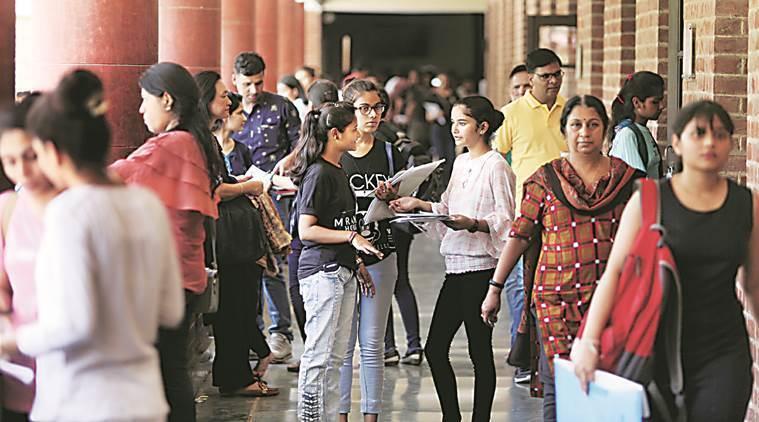Centralised Tests Will Kill Colleges, Universities: Educationists

Representational Image. Image Courtesy: NewsBust India
The opposition to the New Education Policy appears to be growing as more educationists sound their concerns about the Centre’s plan to introduce centralised entrance tests and turn single stream colleges into multi-disciplinary institutions. In a webinar organised by the Democratic Teachers’ Front, Prince Gajendra Babu, a leading educationist who intensively worked on NEET and its ramifications, said that the country will lose half of its colleges by 2030 if the policy is implemented in letter and spirit.
He said, “the Centre recommended that the single-stream arts and commerce colleges should be turned into multidisciplinary colleges without any provision for additional funding. High-end private colleges can mobilise funds through different sources. How will state governments will upgrade colleges as they are already financially weak?”
Babu added that the Centre introduced another layer of discrimination by asking state governments to prepare its students for centralised tests. “Around 8 lakh students clear the higher secondary level in Tamil Nadu alone. They have been receiving their education for free up to class XII. Suddenly, you make their journey redundant with your decision that they will have to pass an entrance exam to get admitted into central universities.
For clearing these tests, the poor children need to go to coaching centres. The experience of NEET made it clear that only the rich will get into higher education. So, on the one hand, you are depriving students of their education, on the other, it is hitting federal structure hard by deploying responsibilities with state governments. Even they (states) did not receive their funds for Sarv Shiksha Abhiyan. They are already fighting with the Centre for their fair share of Goods and Services Tax (GST).”
The central universities funded by the University Grants Commission (UGC) are now vying for a common test named CUCET. However, teachers and students have expressed their apprehensions about increased pressure to enrol in coaching centres to pass the tests.
Babu went on to attack the idea of entrance examinations itself as it produces officials with no social understanding. Citing the example of UPSC aspirants, Babu said that the students travel far from their native villages to metropolitan cities, lock themselves in suffocating rooms and prepare for the examinations. They are alienated from society for their careers. When they become officers, they are entirely removed from the ground. Ultimately, they accept the status quo and never challenge it.”
Debaditya Bhattacharya, a professor at Kazi Nazrul University in West Bengal said that the central exams are mere the symptoms of a deep malaise plaguing the system. The Centre established 11 central universities through a single act in 2011. He said, “The idea was to place them in rural and suburban areas so that the students (from these areas) benefitted. But the students did not turn up and seats remained vacant. In one of the political science programmes in the University of South Bihar, we were teaching only six students who had enrolled against a strength of 30 seats. So, the Centre came up with a single test so that these seats could be filled. Now, it failed to understand that the students were not turning up because the tuition fee was 30 times more in comparison with a central university like JNU. Why would students come? But with the central examinations, you are told another lie to cover previous misadventure. Unfortunately, NEP wants this system replicated across the country where poor have little say.”
Talking about the logistics and infrastructure required for conducting the entrance tests, Nivedita Menon, professor at School of International Relations, Jawaharlal Nehru University said that there are several myths being peddled to justify centralised entrance tests through digital methods.
“One of the myths remain that the online examinations are greener and environmental friendly but they are not. We are producing thousands of tonnes of hazardous and toxic e-waste which is not easy to recycle. The second myth we find among academia remains that online exams are cheaper in comparison with pen and paper mode. It is also incorrect because universities are paying in crores to the ed-tech companies by slashing their library and salaries funds. We have multiple examples now where the teachers and non-teaching staff are receiving their salaries late because the companies are claiming elephant’s share from universities. Third, the looming danger is about the dominance of these companies and how they operate with impunity in other countries,” Menon explained.
She added that Pearson, a British tech company has been entrusted with all duties: from online classes, testing, to an evaluation in several states of the USA including Texas and Florida. An investigation found that there were very few constraints on the company about how it used the personal data of millions of students. “In India, we have the example of BYJUs on how it fleeced the students and their parents even by giving unsolicited personal loans.”
Get the latest reports & analysis with people's perspective on Protests, movements & deep analytical videos, discussions of the current affairs in your Telegram app. Subscribe to NewsClick's Telegram channel & get Real-Time updates on stories, as they get published on our website.























